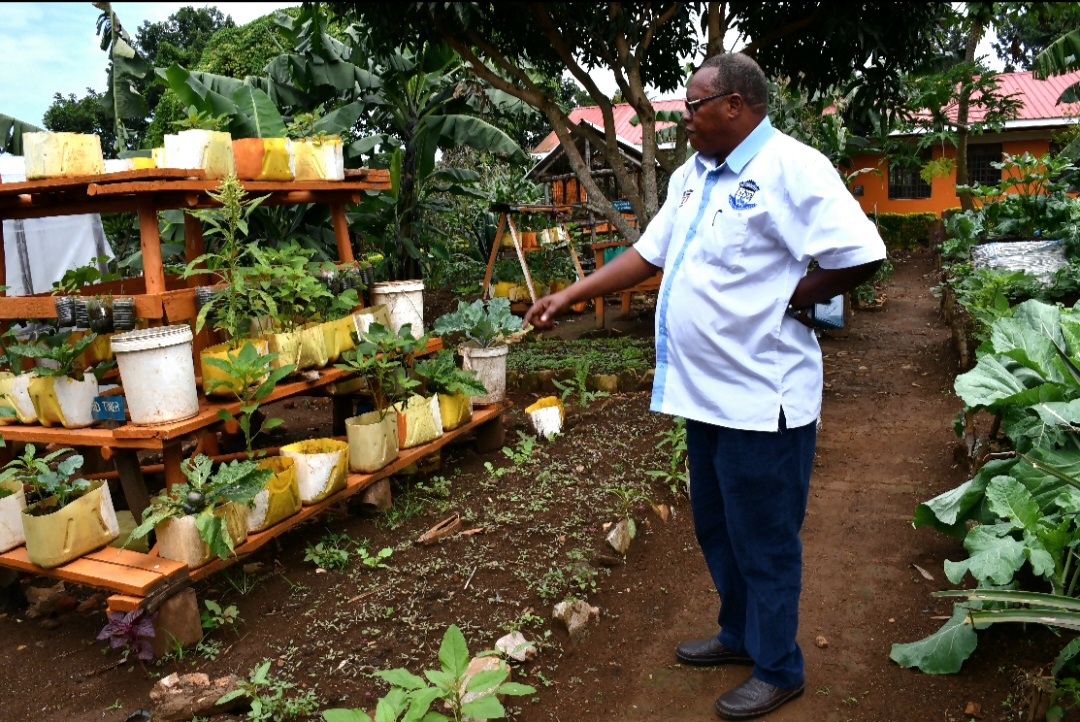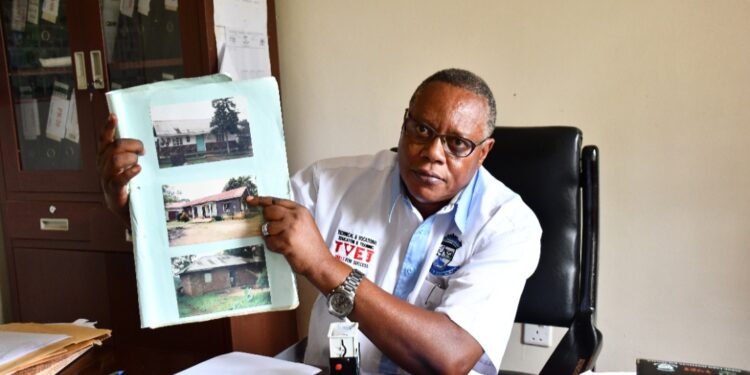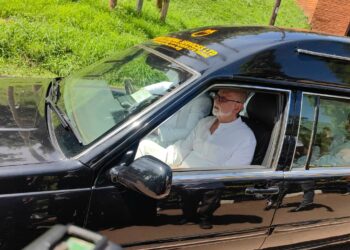In the late days of 1980, Stephen Nabasa rose to the premises of Ssese Farm Institute as a low pupil at the age of sixteen hoping to learn and pursue vocational training not knowing that one day he could end up as the principal of the institution.
“Kalangala had three vehicles back then; the Cooperate Union of Kalangala, Timber cutter and the Lorry,” shares a flamboyant Nabasa as he settles at his office that hangs portraits of Buganda kingdom’s king; Ronald Mutebi, premier Peter Mayiga and longtime serving Uganda’s president Museveni. The trophies of the institution achieved before in sports and academics hangs too in left-side corner in the office.
He shares that the lorry used to transport them from Nyendo- Masaka suburbs and during their journeys; they had to move with an axe, hoe and a spade was very instrumental for student’s security purposes.
The life all together at Ssese Farm institute back then was lowly a test as they consumed sweet potatoes and yellow posho was their source of food under the world food program initiative.
“We could gather firewood on lorry and later in the day we could also do farm work,” he said.
It is a compelling journey as Nabasa shares that they were also getting 90 percent of the food from the main land and the institution had enough resources to satisfy the students with all eatables of kind.
It was the reputable reigns of Mr. Hasim Kintu and Allen Zziwa who doubled as the Ssese Farm Institute secretary that laid a solid foundation for Nabasa to become a formidable student at the institute.
“The Secretary and the Staff were commuting as they had no residence at the institution,” he shares.
“The students were very submissive and no student could outcompete them and they had nicknamed me the prince of the institution,” he says.
Nabasa says as for clarity; they could have an assembly twice in a week and early in thye morning they could assemble for Hot culture and cattle rearing sessions.
“At exactly 5am, we could feed animals and we had a single lamp in the dormitory for reading,” he said.
As for Clarity; Nabasa used to get accommodation from the facility and he could later in the day and weekend perform casual work to get sponsorship from the institution.

“I numerated my mother who was a hands-on woman making pottery in our home village as for survival. She was a talented and creative woman whose hands-on made pottery were booked for exhibitions in the village.
Nabasa was born on November 28 in 1964 and at the age of 17, he joined the institution as a primary seven drop-out.
“I remember my mother made a pot made of two bottle necks and they became the take of the town in our village,” said Nabasa.
It has been his hard working relationship fostered with team work that has elevated him to this far.
As for talent and mentorship, Nabasa started at Kabira Parish in the early days of 1960 to do experimental work for them not knowing the 30 cows he started with could expand the parish farm.
“The Church identified me at the age of 19 as a youth leader and on 1st of January I was introduced as the farm manger by Rev. Fr. Zefaniya Tebanyendera since they had failed with the past farm overseers,” he shares.
The farm was five kilometers from the Kabira Parish Church which needed him to ride a bicycle that was given to him by the parish Priest Tebanyendera.
“I never slept. I was given a small house too which was far from the farm and in the beginning I lost liters of milk to the cattle keepers who could swindle and sell the milk away,” he shares.
“They were milking 22 liters of milk every day and I could receive 10 liters which forced me to stay permanently at the farm with them,” he said.
He says in the first year of his reign; eighteen calves were produced and 15 of them all survived.
In 1986, 26 calves were all produced and they all survived in the farm.
“Whatever salary I could get I could buy a cow and graze them at the farm. The cows grew and expand until when 630 cows were realized which surprise everyone,” he says.
It all started to work miracles for him as the community started consulting him as he could sell Anti-telematics and later purchased 11 acres of land.
“I bought my first land from cows in 1989 and later got married. The father was happy and later gave me 2 more acres of land,” he shares.
It took him a few years before the community scouted him as the community Development Officer in 1991.
It was during the reign as the Community Development Officer where the public picked him and trusted to serve as the Youth Secretary before he enrolled for Cadres training by under Prof. Kalugagu Kalusoke in 1990.
“I gained leadership and managerial skills and later Mr. Odok Benjamin recruited me on Constitutional drafting Committee,” he adds.
Since he had a Certificate in training schools; Nabasa was stationed in Mitoma village as chief trainer in charge of Kabira County.
He says; he went for Diploma in General Agriculture at Kyambogo University in 2000.
“I was rolled in Kitagata in August and became the Deputy Principle for Kitagata Farm institute before the door was opened to serve my mother institution Ssese, Nabasa 61-years-old said.
He says; teaching hands-on training courses grew yonder for him and that’s how he became an indomitable pillar in management.
It was heavily inspired to become the Ssese Farm Institute principle in 1994 until 2000 when the tremendous improvement started to be realized.
It was heavily in 2004, when he enrolled for the Bachelors Degree in Science Agriculture which he attained Uganda Martyrs University.
It was heavily Mr. Mansul Ethali and Roy Muhozi; the Education Officer that guided them to consult the Curriculum Development Centre for Institute for further trainings that have compelled them to reach that far.
“The National Certificate in Agriculture had 30 students in 2013 and today one of the student Ms Immaculate Kyomukwijuka whose humble beginnings started here is the principle of Kitagata Farm Institute,” he said.
He says the Education system of the country lacks the wholly well designed curriculum of hands-on trainings and the current trend of the country needs people who are practically skilled in all aspects of their profession.
The existence of the liberation of the institution initiative; skilling Uganda which started in 2018 and trained staff, local and many in Livestock production and Business Management gave the institution a new face according to Nabasa.
It has taken staff members to continental training like in countries India during 2020 government program.
He says; all students of traditional courses benefited from the institution and it has been a cake sliced on a table to many community members; leaders and the students themselves.
“The first-intake took 35 students and the second and third saw 45 and 58 students achieving their Certificates in Livestock production and Business Management.
“The basis of it all is that the government initiated program; Skilling Uganda helped us grow materially, practically and visibly as an institution.
According to Nabasa; they have been determined as teachers to change the face of the institution and the well-being of the students by equipping the best out from them.
“The tutors of Livestock production and Business Management course wholly trained by the government and all had a Diploma in relevant course especially Crop and Animal Production.
Currently the Ssese Farm Institute sits on 36 acres with 405 students and eighteen teachers which have all greatly impacted the growth of his leadership and the institution in general.
“I thank president Museveni for championing this program and contributing heavily on the growth of the institution that supports local farms; Delta within the area,” said Nabasa also boast with a Bachelor’s Degree in Science Agriculture which he attained at Uganda Martyrs University..
As for clarity; the government contributed shs; 500,000 to cater for 33 students on Livestock production and Business management course compared to shs: 2.1m charged as tuition for students pursuing others courses.
It is under his reign that the government managed to contribute shs: 4.8billion to cater for skilling Uganda Initiative for Ssese Farm Institute under the agreement signed on March, 9, 2020 by the Ministry of Education.
“We are still hopeful the government will contribute more funds for all students to benefit from the program,” he added.
Do you have a story in your community or an opinion to share with us: Email us at editorial@watchdoguganda.com










